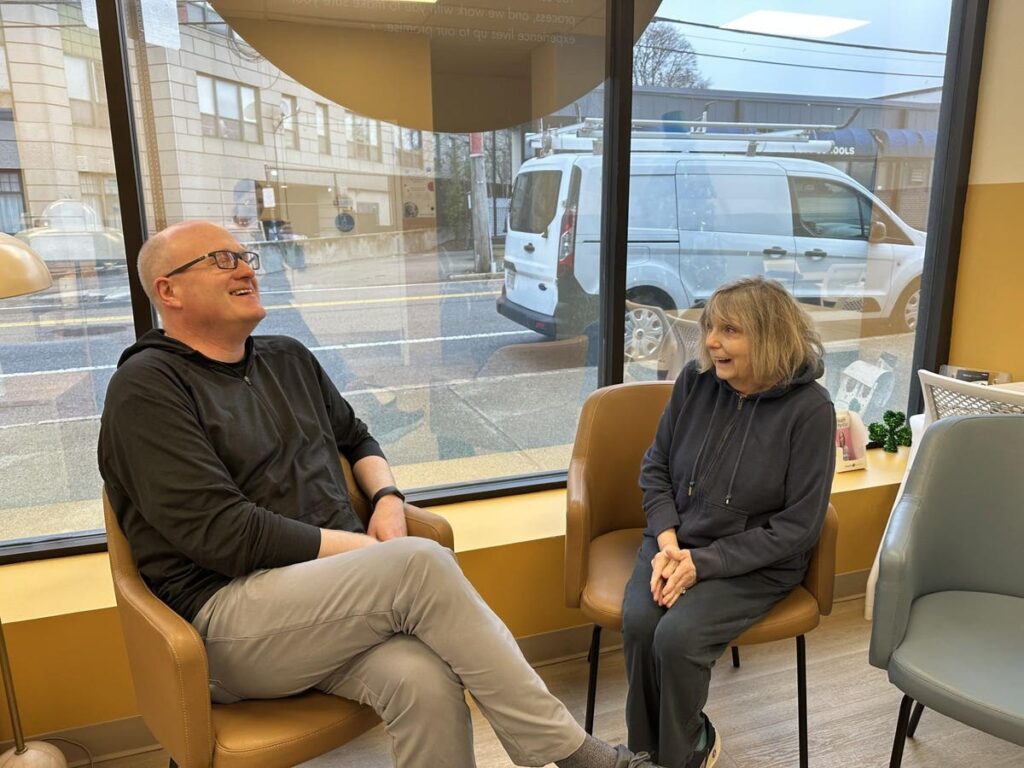After more than a decade as an emergency room doctor, Brent Asplin was fed up. He saw too many patients come in needing treatment for chronic diseases that would have been better addressed if they had a primary care physician, who could help with their underlying conditions. But instead, they were in the ER, getting treated at high cost. “It was much easier for me to admit a patient to the ICU for $10,000 a night than to get an appointment with a primary care physician to get a blood pressure medication for $10 a month,” he told Forbes.
So in 2022, Asplin, 56, launched a primary care startup, Gather Health, to focus specifically on higher risk older people. All of Gather’s patients are 65 or older and on Medicare; the majority of them are also low income and dually eligible for Medicaid. By combining its own medical offices with home care, remote monitoring technology and social events like dinners and card game nights to help with loneliness, Asplin hopes to redefine the way that primary care can work for older adults—and keep these patients out of the ER.
To date, the Quincy, Mass.-based company has signed up more than 2,500 patients and opened four locations in the greater Boston area, where people can come for medical care. One such patient is Leslie Waibel, a 71-year-old retiree in Quincy, who has been using Gather’s medical services for the past year. She’d been diagnosed as diabetic and a Gather nutritionist helped her get her blood sugar levels back in check. Gather also helped her manage her blood pressure at home with a cuff and regular check-ins, get access to SNAP food benefits, and even set her up with a therapist to help her manage her grief over the death of her six-year-old grandson. Though she’s been relatively healthy to date, the focus on her chronic health issues should keep her out of the ER. “I think they go above and beyond,” Waibel said. “If I was really sick, I could call and they would come make a house call on me,” she added. “Thank God, I haven’t had to use that yet.”
The at-home technology, like Waibel’s blood pressure cuff and app, allows Gather Health to flag patients that need care, reducing both emergency room visits and hospitalizations, Asplin said. Gather’s patients show a 53% reduction in hospitalizations after 12 months, he said.
Asplin expects to double Gather Health’s patient population to more than 5,000 by yearend, even without opening new centers. He projects revenue will explode by 25 times to reach $44 million this year, with the first center in Quincy reaching breakeven this April and the next three hitting that mark by yearend. That means revenue in 2024 was below $2 million. All this growth will be fueled by a previously undisclosed $17 million funding round from Khosla Ventures, Maverick Ventures and HC9 Ventures, at a valuation of $47 million.
Ultimately, Asplin hopes to open 15 total locations in Massachusetts, and he’s already considering a second market. “There’s an opportunity here to not only improve outcomes for populations that need it most, but also to build a great business,” he said.
Compared to investments in biotech or AI copilots for doctors, Gather Health’s fundraise is relatively small potatoes, but primary care is a critical—and extremely difficult—market that’s long overdue for improvement. More than 100 million people in the U.S. don’t have a primary care provider, an especially large problem for older adults and those with chronic health conditions. There have been efforts to shake up the primary care market, perhaps most notably One Medical, which charges members $199 a year, and was acquired by Amazon for $3.9 billion two years ago.
Gather Health’s focus on underserved populations and on social programs are major differentiators. To care for these patients, the company uses a value-based model, which ties the amount it earns to the results it delivers its patients, rather than traditional fee-for-service.
Consider its moves in the Boston neighborhood of Dorchester, which has a large immigrant population. After Steward Health Care, the nation’s largest physician-owned hospital operator, filed for Chapter 11 bankruptcy last year, it closed Carney Hospital, a community hospital with 83 beds that had served the neighborhood for more than 100 years. As a result Gather, which opened a Dorchester location just months before the hospital closed, has seen enormous traction there. “We are running to the neighborhoods others are running away from,” Asplin said.
After his decade in the ER, and stints as chief operating officer of VillageMD and president of its primary-care subsidiary Village Medical, Asplin teamed up with venture studio Healthcare Foundry partners Rob Pahlavan, Alon Krashinsky and Brian Lovett, as well as Dr. John Loughnane, former chief medical officer of the Commonwealth Care Alliance, to launch Gather in November 2022. It opened its first practice in Quincy and raised $15 million from Khosla, Maverick and the Commonwealth Care Alliance in April 2023.
For Khosla partner Alex Morgan, who has an M.D. and a Ph.D. in biomedical informatics from Stanford, the investment in Gather Health was personal. “I grew up very poor in New Hampshire and lived with my grandparents for a lot of my childhood,” he said. “There were a lot of issues with health access that were just part of my existence as a child.”
To help with access problems, Gather Health drives its patients to its clinics for free, along with providing at-home care with EMTs and community paramedics. It also collects self-reported health data through an app and uses in-home monitoring technology like blood pressure cuffs, glucose monitors and pulse oximeters. While other primary-care providers send nurse practitioners to the home, Asplin said that the cost makes it prohibitive to scale such a model. “That’s great care for the people that get it but it is challenging to get to a broad-based Medicare population,” he said. “It’s just too expensive. They see four people a day. I did that in a prior role, and we never got to more than 4% of patients in home.” Gather Health’s use of paramedics combined with monitoring technology keeps that cost down and allows it to focus its efforts on the patients who need in-person care.
Through its in-person gatherings for patients, Gather is also trying to address problems with isolation among older adults, which research shows is a significant health risk: Those who are persistently lonely experience a 57% increased mortality risk. Isolated adults are also more likely to develop dementia and heart disease, Asplin said. “We have proven in this country that if you let older adults with chronic conditions sit alone long enough, pretty soon they’re going to need a hospital bed,” he said. “It leads to greater disease burdens, earlier deaths and more costs to the health system.”
Over time, Gather Health intends to add more AI to its technology so that, ultimately, its doctors could predict patients’ health issues rather than treating them after they appear. “You cannot solve chronic conditions with a 10-minute visit three times a year,” he said, adding, “I think of it as having a really sophisticated green, yellow or red light over a patient’s head 24-7.”
MORE FROM FORBES
Read the full article here











